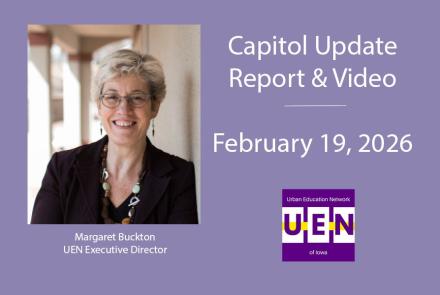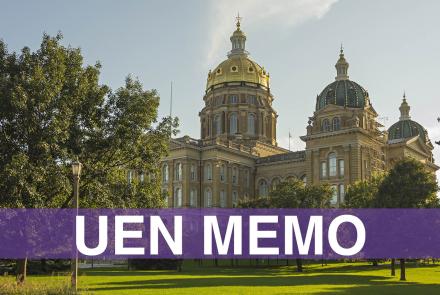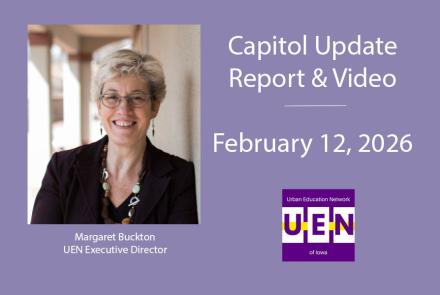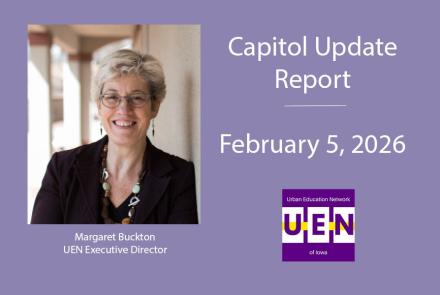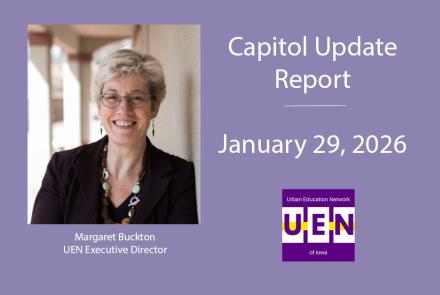Capitol Update - March 22, 2024
UEN Legislative Update
March 22, 2024
Download the Printable Version of this Weekly Report
This UEN Weekly Report from the 2024 Legislative Session includes:
- The Big Three: SSA, AEAS and Teacher Pay
- Senate Floor Action
- Committee Action
- Finishing the Session
- Advocacy Actions and Links to Advocacy Resources
Agreement on AEAs, SSA and Teacher Pay Debated in the House
HF 2612 AEA Reform was debated on Thursday evening, amended by H-8237 and approved by the House, with 51 votes in favor, 42 opposed and 7 absent or not voting. (Republican Reps. Andrews, Cisneros, Dieken, Graber, Jeneary, G. Mohr, Rinker, Sorenson, C. Thomson voted no and two Republicans missed the vote.) This sends the bill as amended to the Senate which could act as early as Monday. UEN was registered as undecided before the amendment. With the significant funding for SSA and Teacher Pay combined with improvements to the AEA policy, UEN will change our registration to support. The bill contains the following Divisions regarding AEA reform, teacher pay, education support staff pay, and SSA percentage of 2.5%.
- Division I DE Oversight: creates a Division of Special Education in the DE. Requires the DE to develop and distribute to school districts, nonpublic schools and AEAs a list of evidence-based professional development services that AEAs may provide to schools. Requires DE to oversee the operations of AEAs to ensure compliance with all special education state and federal laws beginning July 1, 2024.
Recommendations of the Special Education Support for Students at Nonpublic Schools Task Force Report from 2022: requires DE to implement the following: provide support to school districts in special education instruction, FAPE information and process to facilitate IEP development , professional learning and support materials and tools for IEP team participants, information to IEP teams that nonpublic school placement is appropriate unless the IEP requires another arrangement, provide professional learning and other materials for meaningful consultation, establish sustainable accountability and data collection systems related to special education to meet federal and state legal requirements and encourage innovative models to meet student needs, and provide an implementation plan for schools relating to strategies for identifying, evaluating and promoting and providing services that improve experiences and outcomes for students with disabilities.
Division of Special Education Employees: defines the 13 FTES in Des Moines and requires 5 FTEs in each AEA for compliance for the FY 2024-25 school year. Requires, as determined by the Division of Special Education, state employees not to exceed 40 total FTEs statewide, to be distributed commensurate with school district enrollment in the AEA to ensure compliance with all applicable federal and state laws related to special education.
Division II General Provisions: adds to the AEA general intent statement the duty of the AEAs to improve student achievement and to close student achievement gaps. Establishes 9 AEAs throughout the state, under the general supervision of the DE director except as otherwise provided in this chapter. Requires AEA Boards to be advisory. Allows districts to contract with an AEA for services. Allows AEAs to provide professional development services either already on the list above or if the DE Director grants approval to the AEA. Allows AEA to provide services to districts/nonpublic school within its boundaries or from a contiguous AEAs. Also allows districts that share a superintendent to access services in one AEA. Requires AEA to charge reasonable costs consistent with current market rates for education services, special education services, PD services and media services. Requires an annual report by Jan. 1 to districts and nonpublic schools about the services provided and the costs.
Duties and powers of AEA boards: requires AEA boards to advise and consult with the AEA on policies and procedures for providing programs and services. Retains AEA authority to receive and expend money for providing programs and services, provide data and reports as directed by the DE Director, provide for advisory committees as necessary, and be authorized, subject to state BOE rules, to provide directly or via contract for special education, media services and educational programs and services requested by local boards of education, including approving contracts. Allows AEAs to cooperate and contract with each other and to lease, purchase or lease-purchase, operate and maintain property.
Requires AEA administrators’ salaries to not exceed 125% of the average salary of all superintendents of school districts located within the boundaries of the AEA at the time an employment agreement is entered into or renewed. Requires the AEA board to submit the AEA budget to the Director of the DE by March 1 annually, who approves the budget, and by March 15 submits it to the state BOE for approval.
Requires the AEA to submit quarterly reports to school districts receiving services, including a monetary accounting of payments the AEA received from the district, special education services provided by the AEA to the district, services provided under Part C of IDEA, child find services, and services provided to nonpublic and charter schools.
Requires the AEA special education director to be an employee of the DE. Prohibits the special education director from being an employee of the AEA, receiving compensation from the AEA, supervising or managing employees of the AEA or providing special education services for the AEA. Defines the director of special education’s primary job duties and responsibilities to provide oversight of the AEA’s special education services.
Changes AEA Board membership, requiring a majority of the board members to reside in the AEA boundaries and be elected by area school districts by director district. Requires four board members to be superintendents in districts in the AEA, appointed by the majority vote of superintendents in the school districts in the AEA. Allows the superintendent appointed to designate any individual to serve for all or the remainder of the superintendent’s term. Requires a director district convention be called to elect a new board member to fill a vacancy, unless the vacancy is a superintendent, in which case, the replacement is appointed by a majority vote of superintendent of school districts within the AEA boundaries.
If accreditation deficiencies are not corrected, requires the DE Director to take one of two actions: 1) merge the deficient program with another AEA’s program or 2) contract with another AEA or public educational institution for purposes of the program delivery (this provision is effective July 1, 2025). Requires the State BOE, in consultation with the Division of Special Education of the DE, to develop AEA Accreditation Standards in eighteen articulate areas and rules for accreditation (this provision is effective July 1, 2025).
Continues the requirement for the DE to establish teacher development academies if funds are allocated and adds the requirement that the academies be for nonpublic schools, in addition to public school-based teams of teachers and instructional leaders.
- Division II Task Force: requires the Legislative Council to convene an AEA Task Force to study AEAs and make recommendations related to how to improve the outcomes of students who utilize services provided by AEA, the amount of compensation paid to AEA administrators, core services provided by AEAs and how best to fund services, including: 1) crisis response services, 2) media services for nonpublic schools, 3) Professional Development services, 4) cooperative purchasing, 5) regional planning partnerships, 6) CTE/Perkins services, 7) ESSA services, 8) special education equipment services. The Task Force is also required to study and make recommendations related to: 1) AEA facilities and property, 2) media, educational and special education services provided by each AEA, 3) what services AEAs schools provide, 4) current accountability measures applied to AEAs, 5) special education provided by the DE Division of Special Education, AEAs and school districts, 6) overall organizational structure that determines how special education services are provided to students in Iowa, 7) how AEA operation is overseen, 8) Accreditation standards for AEAs, 9) timeline for modifications to staffing numbers of AEA and transition of responsibilities related to oversight of AEAs. Specifies voting members of the Task Force (including various stakeholders from districts of various sizes, and includes one member appointed by the Governor, one appointed by the DE Director, and the chief administrator of Heartland AEA). Also includes Senators and Representatives that are ex officio, non-voting members. Requires the findings reported by Dec. 31, 2024 and requires the report to include an examination and evaluation of the impact on AEAs and their operations and services made by this Act.
Continuous Improvement: requires each AEA to submit a report to the DE Director and General Assembly on or before Jan. 1, 2025, that contains the following information: 1) progress the AEA has made in reducing expenditures associated with administration, including chief administrators, directors and department heads, regional administration and regional and zone coordinators, district coordinators, and human resources and personnel management by at least 30% by July 1, 2026. 2) a proposal for the reorganization of services provided by AEAs to centralize some services provided by the AEAs, including media services and to create centers of excellence for other services. 3) Progress the AEA has made to improve outcomes achievement by students receiving special education services and a description of how the AEA is focusing the moneys it receives on providing service in the classroom.
Transition Provisions: an accredited AEA remains accredited until the DSE acts to remove accreditation after a review. Also requires the DSE to give preference to qualified personnel employed by the AEAs in hiring the division of special education director within each AEA.
- Division III Funding: beginning July 1, 2025, requires districts spend 90% of Special Education Services funding for special education services contracted from an AEA. The contract between the AEA and the district for special education services shall not require the districts to describe the specific services the district will receive and shall not be limited by the amount of funding the school districts provide to the AEA.
Beginning July 1, 2024, requires DOM to deduct from school districts and pay to respective AEAs: 1) special education support services, 2) 40% of media services, 3) AEA TSS, 4) 40% of educational services, 5) amount due to AEA for shared operational functions. Beginning July 1, 2025, and each year thereafter, DOM shall deduct from school districts and pay to respective AEAs: 1) AEA TSS, 2) amount due to AEA for shared operational functions. Requires DOM to apportion the $7.5 million statutory deduction applied to funds retained by school districts and those the AEA would otherwise receive under this section.
Requires for fiscal years beginning on or after July 1, 2024, media services and educational services funds not required to be paid to an AEA may be used by the school district for any school district general fund purpose. Allows school districts to use media or educational services for special education support services. Eliminates the PD funding for AEAs.
- Division IV Teacher Compensation and IPERS: allows teachers whose first month of retirement entitlement is July 2024 or later, but before July 1, 2027, the teacher may return to covered employment as a teacher after receiving one month of retirement benefits.
Sets minimum teacher pay for July 1, 2024 at $47,500 and sets the minimum salary for a teacher with at least 12 years of teaching experience at $60,000. Increases that minimum to $50,000 beginning July 1, 2025 and increases the minimum salary for a teacher with at least 12 years of teaching experience at $62,000. Requires DOM to categorize all teachers in 10 tiers according to each school district’s actual enrollment. Requires DOM to strive to include districts serving over 3,500 students together in tiers. Requires DOM to calculate the TSS based in part on the average required for the tier to meet the costs of the two minimums and employer costs of FICA and IPERS associated with the minimums. If, however, the TSS calculated for the tier is not sufficient to meet a school district’s cost of implementation, it requires DOM to set the district’s TSS at an amount necessary to meet the district’s minimum salary requirements and associated costs. Repeats the process for the year beginning July 1, 2025.
For the budget year beginning July 1, 2026 and future years, TSS will include the TSS state aid associated with the SSA rate for the year.
- Division VI State Percent of Growth: sets the SSA per pupil increase at 2.5 percent. Continues the property tax replacement payment. For the budget year beginning July 1, 2024, sets the property tax replacement payment at $153 plus the adjustment to the regular foundation base per pupil percentage.
- Division VII Education Support Personnel Salary Supplement: states that if funds are appropriated by the general assembly for the fiscal year beginning July 1, 2024 and ending July 1, 2025, funds shall be used to provide a funding supplement to each school district during the fiscal year to support education support personnel compensation. Requires school districts to report to the DE the number of education support personnel employed by the school district, as required by DE. Prorates the $14 million appropriation by the quotient of the school districts’ budget enrollment for the budget year beginning July 1, 2023, divided by the statewide total budget enrollment for the budget year beginning July 1, 2023. Defines “education support personnel” to mean regular and part-time employees of a school district who are not salaried.
- Division VIII: specifies that the Iowa Code provisions of 25B.2 regarding unfunded mandates does not apply.
Senate Floor Action
HF 2150 Transitional Coaching Authorization: Senate amended the bill, which eliminates a requirement that transition coaches complete BOEE’s shortened course of training relating to the code of professional rights and responsibilities, practices, to also require transitional coaches to complete CPR training. Senate approved it and sends it back to the House. UEN is registered as undecided.
HF 2152 – Education Commission on Educator Leadership: Senate approved the bill, which eliminates a report of the Commission, 48-0, which sends it to the Governor. UEN is registered as undecided.
HF 2612 AEA Reform was amended and passed in the Senate on Monday, March 18, with amendment S-5043, further amended by S-5062. Republicans Brown, Klimesh, McClintock, Salmon, and J. Taylor joined with the Democrats to vote against the bill, which passed 26 to 22. The bill as amended returned to the House. Since the Senate amendment was changed during the House consideration on Thursday and is no longer relevant, we are not providing the detailed summary in this report. If you are interested in reviewing it, however, please reach out to margaret@iowaschoolfinance.com, and we will provide the information to you.
Committee Action
HJR 2006 and SJR 2003 Constitutional Amendment Income Tax and Tax Increases: these Joint Resolutions propose a constitutional amendment to require 2/3 approval of both chambers for increasing tax rates. Also, would prohibit a graduated income tax and require that the income tax be set at one flat rate. The House Resolution is on the House Ways and Means Calendar. The Senate Resolution is on the Senate’s Unfinished Business Calendar. UEN is opposed.
SSB 3189 Constitutional Amendment Income Tax: this bill proposes a Constitutional Amendment requiring a flat income tax rate and prohibiting a graduated income tax rate. UEN is opposed.
SF 2411 Work-based Learning. Provisions impacting education: WBL: Allows High School career and technical education classes to use work-based learning. Teachers: Allows a student-teacher experience requirement to be reduced to four weeks if the teacher meets certain criteria such as apprenticeship with TPRA. Amended and passed by Senate Appropriations Committee 14-6, moving it to the Senate Calendar (formerly SF 2260). UEN supports.
HF 2653 Perry Retention Bonuses: Allows school districts to use the district management levy to pay for retention bonuses for school employees, if the school is the subject of a disaster proclamation in the 2023-24 school year and in three counties (would only apply to the Perry School district). Limits the payments to $700,000. Authorizes the waiver of various school requirements but does not authorize the waiver of any federal requirements. Effective on enactment. Approved by Senate Ways and Means Committee 17-0, moving it to the Senate Ways and Means Calendar. UEN supports.
Finishing the Session
See the March 15 UEN Weekly Report for School Start Date Status, Unfinished Business Calendar meaning and list of bills, Funnel Survivors and Dead Bills. April 16 is the last day of legislative per diem payments and they generally try to finish the Session by that time. The legislature has to debate some policy bills, if they intend to enact them. They need to get several big appropriations bills started and finished. They must approve whatever additional tax policy they intend to pass. Their plates are full. Stay attentive for the next three weeks in case some bad policies come back as amendments. Watch for moments to thank legislators for their work that supports your school district staff, students and communities.
Advocacy Actions
AEA, SSA and Teacher Pay Bill: HF 2612 is back in the Senate. Encourage the Senate to act quickly to approve the compromise so schools can know the SSA rate and learn soon how much funding will be available for paying teachers and education support staff in Iowa schools.
Share a Success Story in your School District: reach out to your Senator and Representative and share a success story of a great program helping students, a staff member going above and beyond, a student who has achieved an extraordinary achievement, a collaboration between your district and an AEA to solve a problem, or some community collaboration that is making a difference. If the story concerns quality preschool, you can easily transition to the next advocacy action.
Quality Preschool and Other UEN Priorities: Continue to talk about the value of Quality Preschool and Teacher and other Staff Shortages. SF 2383 Expanded Preschool is on the Senate Calendar but is unlikely to move forward due to the estimated impact of the bill on the state budget. The bill is phased in over two years, up to 1.0 weighting for students below 185% of the federal poverty level. Contact Senators to support it. Find Issue Briefs and other resources on the UEN Advocacy website to find talking points or other resources to share when you meet with policymakers.
Connecting with Legislators: To call and leave a message at the Statehouse during the legislative session, the House switchboard operator number is 515.281.3221 and the Senate switchboard operator number is 515.281.3371. You can ask if they are available or leave a message for them to call you back. You can also ask them what’s the best way to contact them during session. They may prefer email or text message or phone call based on their personal preferences.
Find biographical information about legislators gleaned from their election websites on the ISFIS site here: http://www.iowaschoolfinance.com/legislative_bios. Learn about your new representatives and senators or find out something you don’t know about incumbents.
Find out who your legislators are through the interactive map or address search posted on the Legislative Website here: https://www.legis.iowa.gov/legislators/find
UEN Advocacy Resources: Check out the UEN Website at www.uen-ia.org to find Issue Briefs, UEN Weekly Update Legislative Reports and Videos, UEN Calls to Action when immediate advocacy action is required, testimony presented to the State Board of Education, the DE or any legislative committee or public hearing, and links to fiscal information that may inform your work. The latest legislative actions from the Statehouse will be posted at: www.uen-ia.org/blogs-list. See the 2024 UEN Advocacy Handbook, which is also available from the subscriber section of the UEN website.
Contact us with any questions, feedback or suggestions to better prepare your advocacy work:
Margaret Buckton
UEN Executive Director/Legislative Analyst
margaret@iowaschoolfinance.com
515.201.3755 Cell
Thanks to our UEN Corporate Sponsors:
Special thank you to your UEN Corporate Sponsors for their support of UEN programs and services. Find information about how these organizations may help your district on the Corporate Sponsor page of the UEN website at www.uen-ia.org/uen-sponsors.
- Public Progress LLC - thepublicprogress.com
- Solution Tree - www.solutiontree.com/st-states/iowa


